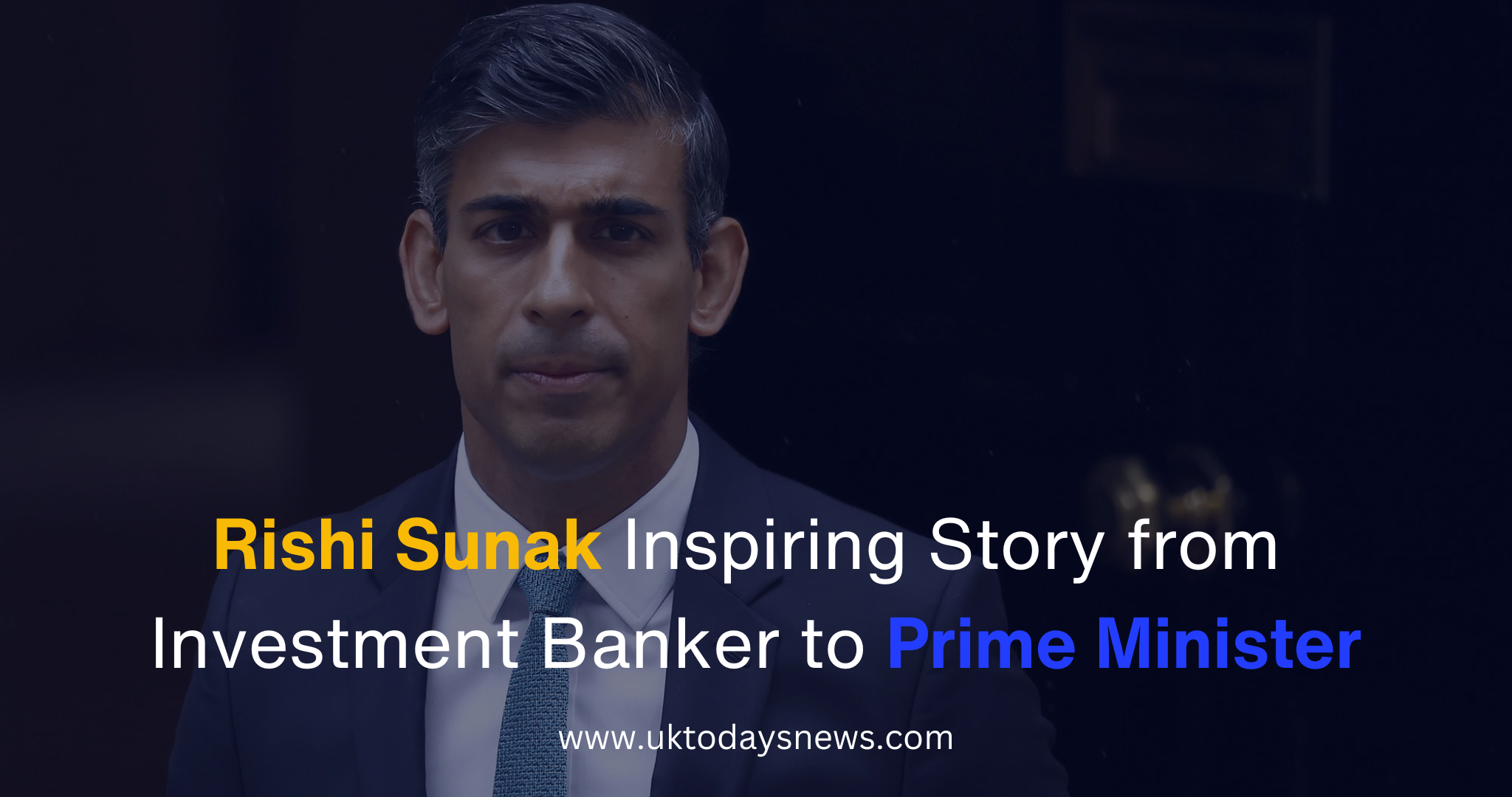In the world of politics, there are countless tales of individuals who have risen from humble beginnings to become leaders of their countries. One such inspiring story is that of Rishi Sunak, who went from being an investment banker to becoming the youngest Chancellor of the Exchequer in the United Kingdom’s history. Born in Southampton to Indian parents, Sunak grew up in a household that placed a strong emphasis on education and hard work. After studying at Oxford and later at Stanford University, he worked for some of the most prestigious firms in the financial sector, including Goldman Sachs and The Children’s Investment Fund Management. However, his life took an unexpected turn when he decided to enter politics and was elected as the Member of Parliament for Richmond in Yorkshire. Sunak’s meteoric rise continued when he was appointed Chancellor by Prime Minister Boris Johnson in February 2020, just a few months before the COVID-19 pandemic hit. In this article, we’ll explore the incredible journey of Rishi Sunak and how his background in finance has helped him navigate one of the toughest economic crises in modern history.
1.Early life and education

Rishi Sunak was born on May 12, 1980, in Southampton, England. His parents, Yashvir and Usha Sunak, were Indian immigrants who had moved to the UK in the 1960s. Sunak grew up in a middle-class family that placed a strong emphasis on education and hard work. He attended Winchester College, a prestigious boarding school in Hampshire, on a scholarship. After completing his A-levels, he went on to study Philosophy, Politics and Economics (PPE) at Lincoln College, Oxford.
At Oxford, Sunak was an active member of the Conservative Association and was elected as the President of the Oxford Union, a prestigious debating society. After completing his degree, he went on to study for an MBA at Stanford University in California. During his time at Stanford, he interned at Goldman Sachs, one of the world’s largest investment banks. It was this experience that would shape his future career in finance.
2.Career in finance and investment banking

After completing his MBA, Sunak joined Goldman Sachs as an analyst in their Investment Banking Division. He worked at the firm for two years before moving to The Children’s Investment Fund Management (TCI), a London-based hedge fund. At TCI, Sunak worked as a Vice President, focusing on investments in the healthcare sector. He quickly rose through the ranks and was promoted to Partner in just three years.
Sunak’s career in finance was marked by his success in identifying profitable investments and growing businesses. He had a reputation for being a hard-working and talented investor who could spot opportunities where others couldn’t. His time in finance would prove to be invaluable when he later entered politics and had to navigate the complex world of economic policy.
3.Entry into politics

Sunak’s entry into politics was somewhat unexpected. After leaving TCI in 2009, he went on to co-found Theleme Partners, a hedge fund that focused on European equities. However, he had always been interested in public service and had been a member of the Conservative Party since his university days.
In 2014, Sunak was selected as the Conservative Party candidate for the constituency of Richmond in Yorkshire. The seat had previously been held by William Hague, a former Conservative Party leader and Foreign Secretary. Sunak’s selection was seen as somewhat of a surprise, given that he had no prior political experience. However, he quickly proved himself to be a capable campaigner and went on to win the seat in the 2015 General Election.
4.Rise to prominence in Conservative Party

Sunak’s rise to prominence in the Conservative Party was rapid. In his first term as an MP, he was appointed to the Environment, Food and Rural Affairs Select Committee. He also served as the Parliamentary Private Secretary to the Minister of State for Employment. In 2017, he was re-elected with an increased majority and was appointed as the Parliamentary Under-Secretary of State for Local Government.
Sunak’s performance in government was impressive, and he quickly gained a reputation as a rising star in the Conservative Party. He was seen as a competent and hard-working minister who was not afraid to take on difficult policy challenges. In 2019, he was appointed as the Chief Secretary to the Treasury, a role that gave him responsibility for overseeing public spending and managing the UK’s finances.
5.Appointment as Chancellor of the Exchequer
Sunak’s appointment as Chancellor of the Exchequer in February 2020 was unexpected. His predecessor, Sajid Javid, had resigned following a dispute with Prime Minister Boris Johnson over the appointment of his advisers. Sunak was seen as a safe pair of hands, and his background in finance made him a natural choice for the role.
Sunak’s appointment came at a difficult time for the UK. The country was just a few months away from the COVID-19 pandemic, which would have a devastating impact on the economy. Sunak was tasked with managing the government’s response to the crisis and developing policies to support businesses and individuals affected by the pandemic.
6.Handling of COVID-19 pandemic and economic crisis

Sunak’s handling of the COVID-19 pandemic and economic crisis has been widely praised. He quickly announced a series of measures to support businesses and individuals affected by the pandemic, including the Coronavirus Job Retention Scheme (CJRS) and the Self-Employment Income Support Scheme (SEISS). He also announced a range of measures to support the health service and other public services, including a £750 million funding boost for the NHS.
Sunak’s economic policies have been aimed at protecting jobs and businesses and supporting the UK’s economic recovery. He has announced a range of measures, including tax cuts and investment in infrastructure, to stimulate growth and create jobs. He has also introduced a range of measures to support small businesses and startups, including a £500 million fund to help high-growth firms.
7.Economic policies and initiatives under Rishi Sunak
Sunak’s economic policies and initiatives have been focused on supporting businesses and individuals affected by the pandemic and driving the UK’s economic recovery. He has announced a range of measures, including tax cuts and investment in infrastructure, to stimulate growth and create jobs. He has also introduced a range of measures to support small businesses and startups, including a £500 million fund to help high-growth firms.
One of Sunak’s key initiatives has been the “Eat Out to Help Out” scheme, which offered diners a 50% discount on meals at participating restaurants. The scheme was aimed at supporting the hospitality sector, which had been hit hard by the pandemic. It was hugely popular and helped to boost consumer confidence and stimulate spending.
Sunak has also announced a range of measures to support the property market, including a stamp duty holiday and a £2 billion Green Homes Grant scheme. The stamp duty holiday has been widely credited with driving a surge in property sales, while the Green Homes Grant scheme is aimed at supporting the UK’s transition to a low-carbon economy.
8.Public perception and future prospects
Sunak’s handling of the COVID-19 pandemic and economic crisis has been widely praised, and his approval ratings have soared in recent months. He is seen as a competent and capable Chancellor who has been able to manage one of the toughest economic crises in modern history.
His future prospects are also bright. He is seen as a potential future leader of the Conservative Party and has been tipped as a possible successor to Boris Johnson. However, he faces some tough challenges in the coming months, including the ongoing negotiations with the European Union over Brexit and the need to support the UK’s economic recovery.
Conclusion and lessons to learn from uk prime minister rishi sunak’s journey
Rishi Sunak’s journey from investment banker to Chancellor of the Exchequer is an inspiring one. His background in finance has proved invaluable in navigating one of the toughest economic crises in modern history. He has shown himself to be a competent and capable minister who is not afraid to take on difficult policy challenges.
There are several lessons to be learned from Sunak’s journey. Firstly, the importance of education and hard work cannot be overstated. Sunak’s success is a testament to the value of a good education and a strong work ethic. Secondly, his experience in finance highlights the importance of having a diverse range of skills and experiences in politics. Finally, his handling of the COVID-19 pandemic and economic crisis shows the importance of competent and capable leadership in times of crisis.
In conclusion, Rishi Sunak’s story is an inspiring one that shows what can be achieved with hard work, determination and a diverse range of skills and experiences. As the UK faces some of its toughest challenges in decades, Sunak’s leadership will be vital in driving the country’s economic recovery and securing its future prosperity.
Read 7 Breaking News about Ukraine Launches Counteroffensive Against Russian Aggression



1 thought on “Rishi Sunak Inspiring Story from Investment Banker to Prime Minister in 8 points”